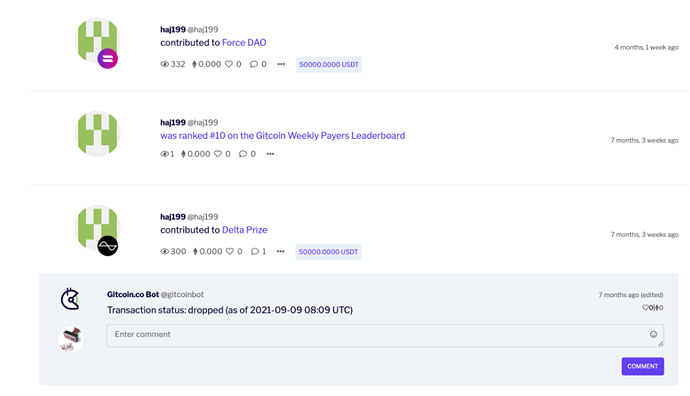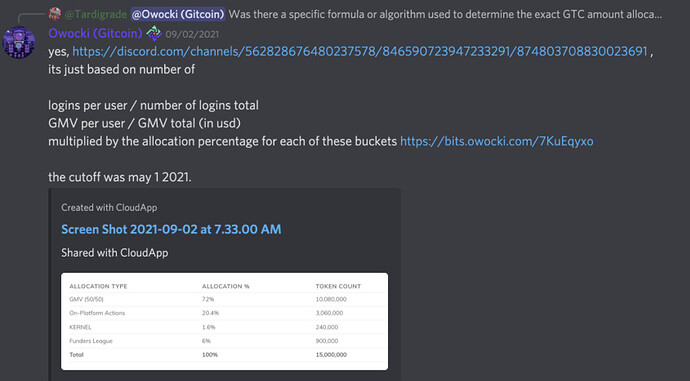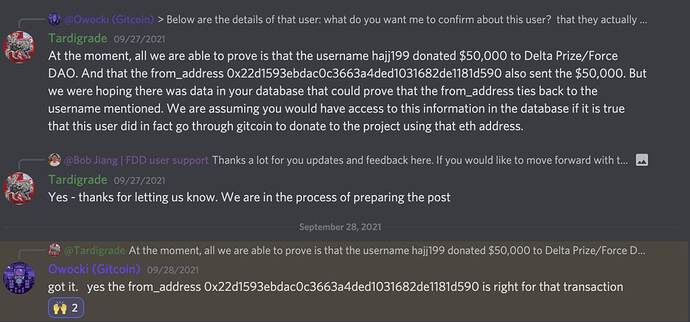I. Overview
The GTC airdrop earlier this year was a great step towards the decentralization of the Gitcoin ecosystem. Unfortunately, there are several users who were eligible for the drop because they funded the project Force DAO before the date of the airdrop, however, an error in the transaction validator ingesting their transactions meant that these users were unable to claim their tokens. Specifically, when these users went to claim their tokens within the 30-day airdrop window, they were not allocated a percent of GTC tokens for their donations to Force DAO. This proposal is looking to retroactively compensate the users who were not able to claim their GTC due to the error.
II. Proposal Details
Since understanding this error involves many fine details and retroactive date tracing, we will look at one user’s experience (@haj199) in order to show how everything unfolded:
-
February 14th 2021: @haj199 donated a grant (Figure 1) to the project Delta Prize.
-
~ March 4th 2021: The project’s name changes on the Gitcoin website from “Delta Prize” to “Force DAO”.
-
~March 10th 2021: The Gitcoin bot drops (Figure 1) haj199’s original transaction to Delta Prize / Force DAO from his Gitcoin account. We examined the Gitcoin code base and did not find a clear reason for this.
-
May 1st 2021: Cutoff date for transactions factoring into the GTC airdrop. Unfortunately for @haj199, his transaction no longer meets the cut off date because the Gitcoin Bot had already dropped it.
-
May 25th 2021: The 1-month window for the airdrop opens.
-
~June 7th 2021: @haj199 attempts to claim GTC tokens, but is not able to claim the allocated percent of GTC tokens from his donation to Delta Prize / Force DAO. @haj199 lets Gitcoin know by filling out this form. Gitcoin recognizes that his original transaction before the cut-off date was valid and reposts it (Figure 1) on @haj199’s account. Due to the posting of the transaction occurring after the cut-off date (but not that transaction itself), @haj199 is still unable to claim his GTC reward.
This proposal is asking for a rolling period of 4 weeks for “affected individuals” like @haj199 to resolve inconsistencies with activity shown on their Gitcoin profiles by providing “valid proof” to their eligibility claim. During this 4-week period, users would receive GTC from the DAO treasury upon proving their eligibility.
III. Qualifications and Criteria
Qualifications for “Affected Individuals”:
- Donated to Delta Prize / Force DAO before April 1st 2021 - the cutoff date for the original airdrop.
- Was not compensated by GTC for those donations.
- Attempted to claim GTC within the 1-month airdrop window starting on May 25th 2021.
Criteria for “Valid Proof”:
- Etherscan receipt for transactions before the airdrop cutoff date showing:
a. Transaction hash
b. Interaction with the Gitcoin: Bulk Checkout smart contract
c. Amount sent
d. To address (0xe5b5514e0618f4b55736c0c0c78ccd6f8ac14631)
e. From address - Proof of Wallet ID matching Gitcoin Account
a. Our workstream will ask the Gitcoin Core team to look into their database to verify that the wallet ID that made the original donation matches back to the Gitcoin user claiming they are an affected user.
b. We are assuming that having a transaction re-added during the 1-month airdrop period is proof that the individual attempted to claim GTC within the window. This is because individuals who re-added their transactions were ones who reached out to Gitcoin via the form, thereby interacting with the Gitcoin website at the time.
IV. Distribution
After proving that an individual is an “affected user” and has shown “valid proof” for their GTC claim, we will use the same formula used to calculate their new GTC allocation as was used in the original airdrop:
Formula: GMV per user / GMV Total (in USD, $22,000,000) * GMV Allocation Percent (10,080,000) (see Figure 2 and 3)
After calculating the GTC allocations, the process of distributing the actual GTC tokens from the Gitcoin DAO treasury to the “affected users” is a straightforward one, and would be done using Whaler DAO’s AstroDrop application. To learn more about Whaler DAO and their reliability, feel free to check out their grants page.
V. Motivation and Benefits
By implementing the proposed solution, we uphold the integrity of the Gitcoin ecosystem, ensure equity for all members, and set a positive precedent moving forward. Gitcoin prides itself in empowering participants and emphasizing collaborative behavior. As shown above, it is evident that certain members have not received GTC during the airdrop period despite meeting all requirements and attempting to claim GTC, while other users received their allocation successfully. This proposal aims to retroactively support those members by giving them the GTC they were eligible to originally receive. This allows Gitcoin to stay true to its founding principles while also ensuring all participants are being valued. Finally, this will also set a positive precedent moving forward as it shows that the Gitcoin community through its governance is willing to accommodate and adapt when needed, prioritizing equality and fairness.
VI. Drawbacks
A potential drawback that might prevent people from voting “yes” on this proposal is that it is asking for GTC tokens to be withdrawn from the DAO Treasury, thereby increasing the circulation of GTC in governance. However, as explained above, these tokens should have been distributed to the users from the treasury earlier during the original airdrop as they were eligible. Another drawback in this proposal is that it does not address what the original bug was that caused the original transactions to be dropped by the Gitcoin bot. However, as proven above, it is clear that regardless of what the error was, it’s explanation is not necessarily needed for remedying the solution, as proof of eligibility can be determined without it. It would be useful to eventually find the root cause and identify the bug to prevent future occurrence of this problem, but it is not needed for this proposal.
VII. Voting
Yes: Open up a 4 week-rolling period for “affected users” to resolve inconsistencies with their GTC claims mentioned above. If an affected user is able to prove that they were in fact eligible for a GTC allocation from their donation to Force Dao (using the proof criteria above) and did not receive it, then send them their GTC from the DAO treasury. Voting yes only covers the above use case. It does not cover cases for users who forgot to claim their GTC within the original 1-month airdrop.
No: No 4-week rolling period of GTC drops for affected users who should have received an allocation but did not due to the error in the transaction validator.
- Yes
- No
0 voters
VIII. Figures
Figure 1 (taken October 8th, 2021):
Figure 2 (taken October 8th, 2021):
Figure 3 (taken October 8th, 2021):



